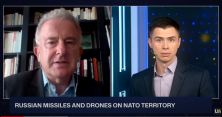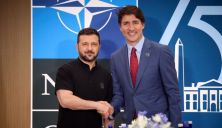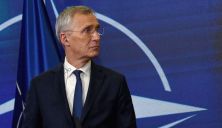Why do NATO countries not react to the fall of drones on their territory? Why does Belarus shoot down Russian drones? How should the alliance react?...
Vous n'êtes pas connecté
- English
- Français
- عربي
- Español
- Deutsch
- Português
- русский язык
- Català
- Italiano
- Nederlands, Vlaams
- Norsk
- فارسی
- বাংলা
- اردو
- Azərbaycan dili
- Bahasa Indonesia
- Հայերեն
- Ελληνικά
- Bosanski jezik
- українська мова
- Íslenska
- Türkmen, Түркмен
- Türkçe
- Shqip
- Eesti keel
- magyar
- Қазақ тілі
- Kalaallisut ; kalaallit oqaasii
- Lietuvių kalba
- Latviešu valoda
- македонски јазик
- Монгол
- Bahasa Melayu ; بهاس ملايو
- ဗမာစာ
- Slovenščina
- тоҷикӣ ; toğikī ; تاجیکی
- ไทย
- O'zbek ; Ўзбек ; أۇزبېك
- Tiếng Việt
- ភាសាខ្មែរ
- རྫོང་ཁ
- Soomaaliga ; af Soomaali
Rubriques :
 Maroc - EURASIAREVIEW.COM - A la une - 10/Sep 22:46
Maroc - EURASIAREVIEW.COM - A la une - 10/Sep 22:46
How US Foreign Policy Affected Relations With Russia – OpEd
By Jonathan Power Two mistakes, committed on President Barack Obama’s watch, were the triggers for the end of the long post-Cold War period of good relations with Russia. They were the attack on Libya by the US, France and the UK and the subsequent killing of its long-time dictator, Muammar Gaddafi. The second was the crisis in Ukraine. Russia was very angry about the first. Having been persuaded by Western diplomacy that the reason for their would-be intervention was essentially humanitarian to forestall any more mass killing in the Libyan civil war, the US and NATO double-crossed Russia. After having gained Russia’s abstention in a UN Security Council vote on a resolution authorizing military intervention the Western powers set about hunting Gaddafi. With the second, Ukraine, Russia felt undermined. This was the result of the twin policies of NATO expansion up to Russia’s border—which the US, Germany, France and the UK had promised would never happen—and EU enlargement. NATO declared that Ukraine would be a NATO member. For its part, the EU had pushed too early and too hard for an association agreement with the corrupt government of President Viktor Yanukovych. When demonstrations erupted in Kiev, the US and the EU lent support and assistance to revolutionary elements and to endorsing a clearly illegal oligarch-ultranationalist revolt in February 2014, despite an agreement made by some of the European powers and Russia that essentially ensured Yanukovych’s departure from the presidency in ten months’ time. Obama has confessed that Libya was his biggest foreign policy mistake. At least it helped lead him not to try and do the same thing in Syria. But there are no mea culpas over Ukraine. The crisis continues into an eleventh year with no end in sight. The West long ago ignored President Vladimir Putin’s suggestion of the deployment of a UN peacekeeping force in eastern Ukraine. Gone are the fashioning of benign policies America and Russia created before—a new nuclear arms reduction treaty, agreeing at the UN to impose tough sanctions on Iran, which led to the denuclearization accord, jointly negotiated, managing Russia’s entry into the World Trade Organisation, the coordinated action to defuse violence in Kyrgyzstan, and Russia supplying engines for the US’s space rockets. There was also a vast expansion of the network used to transport American soldiers and supplies across Russia to Afghanistan. Under Obama the spirit of cooperation had nearly all gone. But President Donald Trump, hoping for a second term, says he wants to bring the era of goodwill back again. Unfortunately, because of his erratic leadership, no one is quite sure whether to trust him. He says one thing about friendship with Russia yet his previous Administration increased sanctions and did a go-slow on arms control. This led to wondering who’s in charge. Is it the so-called Blob, i.e. the senior people in the National Security Council, the State Department, the CIA and the Pentagon who seem to be able, together with their allies in the press and academia, to out-fox their commander in chief? It’s hard to believe that not very long ago Putin was entertaining the possibility of joining NATO. As Zbigniew Brezinski, a pre-eminent foreign policy advisor to presidents, told me, if George H. W. Bush had not been replaced by Bill Clinton these bad mistakes would not have been made and Russia probably would be firmly attached to the West. An influential member of the Blob is Obama’s ex ambassador to Moscow, Michael McFaul. In his book,“From Cold War to Hot Peace”,he pulls Putin to pieces. Although he confesses that before he joined the Administration, he knew not much about the history of Russia nor about Cold War interactions with the country, he engaged in a campaign to persuade Obama to take a hard line with Putin. The book is extremely one-sided. There are important omissions, such as Obama’s confession over the Libyan imbroglio. The Russian media is presented as monolithic and in Putin’s pocket. In fact, in Russia, before Putin went to war, if you wanted to know a different point of view, including Western ones, there were a couple of TV stations, a radio station and two up-market newspapers plus on-line dailies, all with nation-wide reach, who would give it to you. (Today Russian bookshops have some Western books. Most of the internet has free, uncontrolled, access. But U-tube has been pretty well silenced and many books banned.) McFaul doesn’t mention that Obama didn’t have on his staff people who were knowledgeable enough to argue a counterpoint of view, for example he could have summoned the Harvard professor of international affairs, Stephen Walt, whose own book, “The Hell of Good Intentions”, provides that. Walt argues that “Few states have caused more harm to others in recent years than the US has, but not very many.” Finally, McFaul gives no space to the arguments of those who advocated staying friendly and engaged with Russia, whatever happened. Let’s hope Trump, if he wins the election, means what he says about making Russia a friend again. Or will Kamala Harris, if she wins, have the confidence to face down the “blob”? *For 17 years, Jonathan Power was a foreign affairs columnist for the International Herald Tribune.
Articles similaires
NATO’s reaction provokes escalation from Russia. Interview with Nicolas Tenzer
Why do NATO countries not react to the fall of drones on their territory? Why does Belarus shoot down Russian drones? How should the alliance react?...
Ukraine should be allowed long-range strikes on targets in Russia, – Prime Minister of Canada
Canadian Prime Minister Justin Trudeau has said that Ukraine should be allowed to strike deep into Russia, despite Moscow's threats that it would...
Ukraine should be allowed long-range strikes on targets in Russia, – Prime Minister of Canada
Canadian Prime Minister Justin Trudeau has said that Ukraine should be allowed to strike deep into Russia, despite Moscow's threats that it would...
NATO could have done more to prevent a full-scale invasion of the Russian Federation – Jens Stoltenberg
NATO Secretary General Jens Stoltenberg acknowledged that the North Atlantic Alliance could have provided Ukraine with more weapons to prevent...
'Victory Plan' Could Force Russia to End War
Kyiv, Ukraine — Ukrainian President Volodymyr Zelenskyy said Wednesday that a “victory plan” he wants to present to US President Joe Biden later...
The Regime’s Wars Are Built On Lies – OpEd
By Karen Kwiatkowski Americans are increasingly uneasy about their “national” security, and increasingly concerned that war is lapping at our...
The Regime’s Wars Are Built On Lies – OpEd
By Karen Kwiatkowski Americans are increasingly uneasy about their “national” security, and increasingly concerned that war is lapping at our...
Kyiv Regime Shuffles Cabinet Like Deckchairs On The Titanic – OpEd
Dozens of ministers and senior officials in the NATO-backed Kyiv regime have tendered their resignations ahead of a chaotic reshuffle. The political...
Kyiv Regime Shuffles Cabinet Like Deckchairs On The Titanic – OpEd
Dozens of ministers and senior officials in the NATO-backed Kyiv regime have tendered their resignations ahead of a chaotic reshuffle. The political...
Les derniers communiqués
-
Adobe Brings Conversational AI to Trillions of PDFs with the New AI Assistant in Reader and Acrobat
Adobe - 21/02/2024
-
Laura Frigenti takes the Helm as Chief Executive Officer of the Global Partnership for Education
Global Partnership for Education - 05/12/2022


